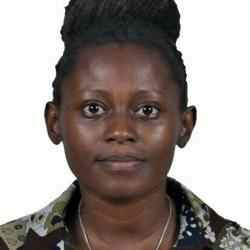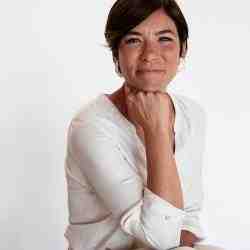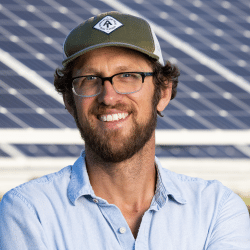Introduction
Federico co-founded Treedom, an online platform that allows people and companies to plant trees remotely and offset CO2 emissions by directly financing small farmers in economic hardship. He is creating an alliance between farmers and supporters willing to make reforestation a sustainable source of long-term income for smallholders. Treedom empowers local communities to start new agricultural enterprises by helping them fill the time gap between planting a seed and growing a tree.
The New Idea
Federico envisions a world full of trees. To fulfill this dream, he enables smallholder farmers to produce income while reforesting their farms. He has created an alliance between an online community of people, mostly in the West, and groups of local farmers, mostly in the Global South. This alliance works towards afforestation and reforestation of fruit trees, which also become a source of income for the farmers. Federico empowers local farmers to start new agricultural enterprises, supporting them technically and economically, filling the time-gap between planting a seed and growing a tree. This enables farmers to cultivate their small plots of land and sell their products, rather than selling or abandoning the land and moving to the city, as it often happens.
Federico’s innovation lies in his strategy. His online platform allows anyone, from any corner of the world, to contribute to reforestation. Each tree is geolocated and photographed so that users can follow its growth. The virtual community is maintained active and can follow the growth of their trees, monitor their CO2 offsetting and communicate with other users (or often, their colleagues) convincing more people to join the platform. Thanks to Federico’s strategy small farmers can now benefit from and play an important role in the CO2 offset market, which they usually don’t have access to.
Federico is generating change on several fronts. He created a new and sustainable model of international cooperation, showing how to create a system that can feed itself without depending on temporary international funds that eventually come to an end. Thanks to Federico’s project, the local farmers manage to cultivate their land without having to sell or cut trees for a quick profit. It also means reversing the trend towards land abandonment and the indiscriminate cutting of trees. His aim is to offer a stimulus to engage local farmers so that trees can become a lasting resource and a source of long-term income, and not a resource of rapid consumption such as timber.
The Problem
According to 2013 Statistical Yearbook of Food and Agriculture Organization, half of the world’s population works in agriculture, and about 2 billion rural people work on farms smaller than 2 hectares. Many of these smallholders are poor, face food insecurity, having limited access to markets, technologies, credit and services. Most smallholders don’t have the capacity to invest resources to increase the productivity of their lands, so they often carry out deforestation activities to enlarge the arable land or as a fall-back in case of necessity, to gain a quick profit selling trees as timber. (Nagayets, O. 2005)
It is estimated that worldwide about 2 billion hectares of forest landscapes have been degraded or even lost, threatening more than 1.6 billion people who, according to a study conducted by the World Bank, on forests in various degrees for their livelihood. Deforestation activities carried out by smallholders pose the danger of further decimation of the forest cover, besides causing a decline in soil fertility, which threatens agricultural productivity and rural livelihoods. This vicious cycle could be broken through reforestation and tree planting.
Tree growing, as opposed to extracting, can be a very profitable product (with a revenue of over $600 billion each year according to the World Bank) but its benefits are almost exclusively captured by the rich. Tree growing is a long-term investment with no intermediate returns, often involving elevated risk due to price fluctuations, tenure insecurity and natural hazards. Many operations, especially in more profitable stages, require machinery, capital outlays, skills and technologies to an extent often beyond the possibilities of poor people. Moreover, the indivisibility of investment in transport, processing and marketing, implies that business will only become competitive beyond a certain production level, which leaves smallholders in disadvantage (Rapsomanikis, G. 2015).
The highest incidence of workers living with their families below the poverty line is associated with employment in agriculture. An average smallholding family, farming less than 1 hectare in Ethiopia, Bangladesh, or Kenya generates about $0.8, $2.9, $1.4 per person per day respectively. Moreover, smallholder production in many developing countries remains at subsistence levels. In Tanzania, an average smallholder family of five persons -living on $1.9 a day each - spends 81% of this budget on food, making it difficult to afford other goods and services, such as education and health or to invest in production increase. (World Bank, 2016).
Unable to access the benefits of more profitable investments, smallholder farmers are often forced to sell their trees and land for quick income to provide for their family in times of need. This leads to a progressive impoverishment of smallholders, who are eventually forced to abandon rural areas and primary activities, moving to urban contexts, often unable to improve their economic and social conditions.
This contributes to the trend of urbanization in developing countries. Globally, the percentage of people living in cities raised from 33.6% to 54.3% between 1960 and 2016 and the percentage of rural dwellers is expected to further plummet from its current level of 47% to 33% by 2050 (Un.org. 2014).
The Strategy
Federico’s model is based on creating a synergic alliance between farmers and their virtual supporters to fight deforestation, with the help of local NGOs, other local partners, citizens and companies. The small-scale reforestation activities provide these communities with an alternative job and income solution deriving from agriculture, higher food safety and competences on tree planting, care and productivity.
Treedom is an online platform that allows people and companies to plant trees online by directly financing small farmers. Treedom empowers local communities to start new agricultural enterprises by helping them fill the time gap between planting a seed and growing a tree. The reforestation projects consist in the planting of fruit trees, which generate commercial value for the farmers. Each intervention is planned to meet the specific characteristics and needs of the area, in terms of biodiversity and ecosystem equilibrium.
In the first phase, local NGOs and project partners follow the management and the logistics of the projects, buying the seeds and the tools necessary for planting with the funding collected by Treedom. Treedom conducts a strict selection process to find the most motivated and engaged farmers. Farmers then directly suggest which tree species to plant, choosing the most beneficial to their needs and to the local biodiversity. Furthermore, Treedom organizes free training sessions with the local community leaders aimed to increase farmers’ skills in forestry, pruning, organic fertilization and agribusiness, providing them with the technical expertise for maintaining a small farm throughout its whole cycle, from cultivation to sale.
The projects are then carried out directly by the local population (individual farmers or small cooperatives). They become the owners of both the means of production and the distribution of the products. An example of this community building and economic development impact is visible in Italy, where Treedom works with Libera Terra, a local cooperative group that fights the mafia by reusing the land formerly owned by criminal organizations and encouraging organic farming. The results of this project include the creation of a sustainable production and trading chain that has a positive impact on society and on those same seized assets, which have become free croplands and are used to create high quality products using eco-friendly methods.
Responsibility, active engagement, and awareness of the subjects involved in the project lead to great results in terms of empowerment and trigger virtuous behaviors of respect and preservation of natural resources. Additionally, since the fruits remain available to farmers and their cooperatives, the communities involved benefit from an increase in their market power, thanks to the micro-entrepreneurial activities related to the commercialization of the fruits and their derivatives.
Federico’s strategies to collect funding are various. Single citizens can buy and plant a new tree in just a few clicks. Detailed information about the trees are provided to orient the customer in the choice. Through the website it is also possible to calculate one’s daily CO2 emissions, and to buy the combination of trees that allow to offset those emissions. Treedom therefore enables smallholders to enter the carbon offset business, which they wouldn’t alone be able to access due to high certification costs. After the tree has been planted, the customer will receive pictures and continuous updates on his/her profile on the Treedom website. The numerous personal profiles create a virtual community, in which one has the possibility to see and comment others’ activity. It is also possible to give a tree as a gift, just choosing one, leaving a virtual message on it, and delivering a gift card manually, via email or through a private message.
<br>Treedom planters’ community also involves hundreds of companies. Various solutions are directed to firms that want to show their commitment to the economic emancipation of smallholder farmers and to be perceived as a “green” brand. Planting trees in a brand’s name, the company can create its own forest. Every tree is planted, photographed and geolocalized by a local farmer. All the trees can be followed online and customized with the company’s logo and a message. Those trees can then be given as gift for engaging customers, employees, attendants to the company’s events, and so on. The recipients will receive continuous updates on the tree, and this will repeatedly remind them of the company. The number and varieties of trees (more than 30 types such as oranges, mangos, caffè, grapefruit, avocados, etc.) to be planted can be chosen in order to compensate the company’s CO2 emissions. Some example of companies who are already using Treedom are: Toyota, Allianz, H&M, Gucci, Nespresso.
Federico now operates in Italy - where 840 farmers are engaged with more than 14000 trees planted - Senegal, Malawi, Haiti, Kenya, Burkina Faso, Nepal, Argentina, and he is now starting to replicate in USA and Germany where he is active since last year. The successful outcomes he is obtaining in all countries involved shows that the model is easily scalable and replicable.
To date, exactly 24.455 farmers have received financial aid to plant a total of 415.747 trees. Treedom is self sustainable, the cost of each tree cover the cost of the whole project and online platform. Besides absorbing CO2 globally, every tree brings social and financial benefits to the farmers who plant them, to their family and to their local community. Treedom conducted a rigorous SROI analysis of its intervention in Kenya, considering as principal beneficiaries both the Community-Based Organization (CBO) of farmers, and the NGO involved. The results – despite not including some environmental benefits that are difficult to quantify – show that the value of the total impact generated by the various outcomes is $4.370.708. Considering an initial investment of $150.000, the social return on every dollar spent is more than $29.
The Person
Federico was born in 1981 in Florence in a middle-class family with strong activist background. During his high school years he was active in the student movement, where he became one of the local leaders.
Federico studied in Denmark and Spain. While in Denmark he had the chance to experience a new lifestyle compared to the one he was used to, based on sustainability and the value of nature, which then became the trigger for his future work. He changed many jobs during his early twenties and experienced the most diverse types of work, from being a bartender to a bank accountant. With this last job in bank he quickly realized that it wasn’t the field where he should be active.
<br>He left that job and came back to Italy when he got the news that his brother was sick and decided he wanted to be around more. He founded an enterprise that produced bio-fuels for the African market. By travelling around the continent, he began to comprehend the scale and diffusion of the practice of cutting trees for charcoal.
<br>His passion for reforestation began here. On his way back to Italy, while playing a famous video-game called Farmville (where the aim is to plant virtual trees in a virtual plot of land) he understood that by mixing online and offline work he could find a way to fight deforestation. This is how Treedom was born.

 Tile image
Tile image


